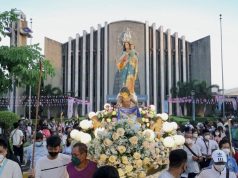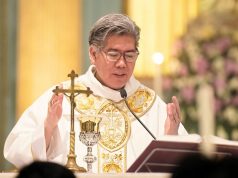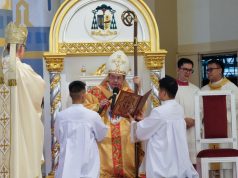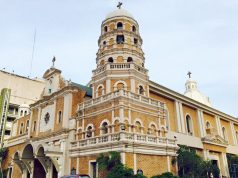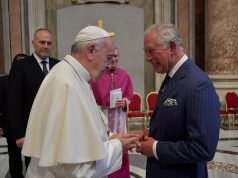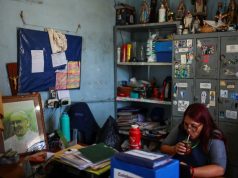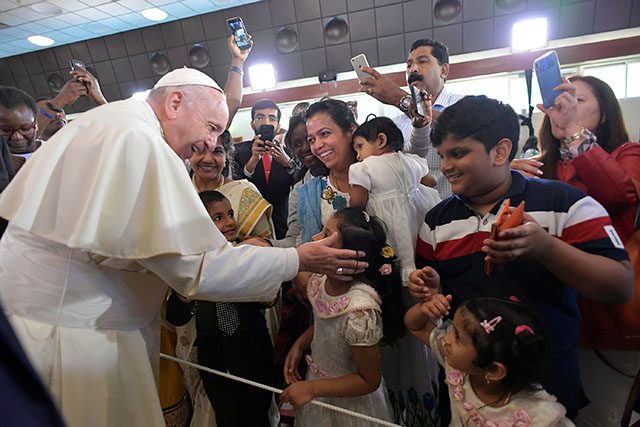
ABU DHABI — Pope Francis, the first pontiff to set foot on the peninsula where Islam was born, met United Arab Emirates leaders in Abu Dhabi on Monday in a historic trip he hopes will foster peace through religious dialogue.
Arriving at the sprawling presidential palace with its many domes of gold and glass, Francis was greeted with a flyover by UAE air force jets spewing out plumes of smoke in yellow and white – the colors of the Vatican flag.
He rode to the main courtyard in a small car escorted by a dozen flag-bearing Emirati guards on horseback. He shunned bulletproof cars or limousines since the start of his papacy.
Once inside the palace, a 370 acre (150 hectares) maze of buildings, gardens and fountains, Francis held private talks with Abu Dhabi’s Crown Prince Sheikh Mohammed bin Zayed al-Nahyan and other UAE leaders.
Writing in the palace guest book, he asked that God grant the UAE “divine blessings of peace and fraternal solidarity”.
The visit takes place in the shadow of the war in Yemen, the poorest Arabian Peninsula nation, where the UAE military has a leading role in a Saudi-led coalition fighting on the side of the internationally recognized Yemeni government that was ousted by the Iran-allied Houthi group.
Francis was due to deliver his only public address of the day later at an inter-religious meeting following a visit to Abu Dhabi’s Sheikh Zayed Grand Mosque, one of the largest in the Islamic world.
The visit received some positive media attention in neighboring Saudi Arabia, the birthplace of Islam and where churches are banned. The main English daily, Arab News, ran a picture of the pope and Abu Dhabi’s crown prince calling it “the moment that made history on the Arabian Peninsula.”
It ran an article citing Muslim and Catholic officials saying Saudi Arabia could feature in a future papal visit.
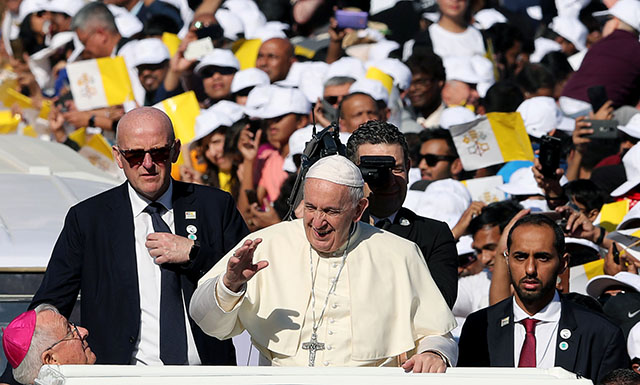
Priests and diplomats describe the UAE as one of the least restrictive environments in the Gulf for Christian worship, which is allowed in church compounds with special licenses. But like other Gulf states, it outlaws unsanctioned religious gatherings and non-Muslims must not proselytize.
Shadow of Yemen war
Vatican officials said before the trip that it was not clear whether the pope would address the subject of the nearly four-year Yemen war in public or private during the trip.
The United Nations is trying to implement a fragile ceasefire deal in Yemen’s main Hodeidah port, a lifeline for millions and the site of some of the war’s fiercest battles. It hopes the deal will pave the way for political negotiations to end the conflict.
Shortly before departing for Abu Dhabi on Sunday, Francis said he was following the humanitarian crisis in Yemen with great concern, using his regular Sunday address in Vatican City to urge all sides to implement the deal and help deliver aid.
“Let us pray strongly because they are children who are hungry, who are thirsty, they don’t have medicine and they are in danger of death,” he said.
The war pitting the Houthi movement against the Saudi-led coalition loyal to ousted President Abd-Rabbu Mansour Hadi has killed tens of thousands of people and left almost 16 million people facing severe hunger.
On Tuesday, before returning to Rome, the pope will celebrate an outdoor mass for some 135,000 Catholics in an Abu Dhabi sports stadium, an event with no precedent in the peninsula. He has said the trip would write “a new page in the history of relations between religions”.
The UAE is home to around 1 million expatriate Catholics, many from the Philippines. Another 1 million Catholics are believed to live in other countries in the Arabian Peninsula.
— Reporting by Philip Pullella and Sylvia Westall; Additional reporting by Stephen Kalin in Riyadh; Editing by Raissa Kasolowsky




